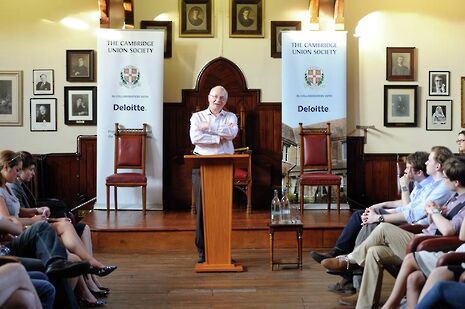“Russia is not understood”: the Russian Ambassador at the Union
Alexander Kramarenko, the Russian ambassador to Britain, spoke last night at the Cambridge Union – discussing Ukraine, LGBT rights, social media and Alexander Litvinenko.

Alexander Kramarenko, the Russian ambassador to Great Britain, spoke at the Union last night. As someone given the diplomatic rank of ‘Ambassador Extraordinary and Plenipotentiary’ by the Russian Government, it was hoped that he’d be able to give some answers on its behalf to several difficult questions concerning Britain's relationship with Russia.
His initial comments, delivered in a near-monotone voice, covered the history of Russian-Western relations in largely factual terms; he lamented that “Russia is not understood” and “if Russia had been invited to join in it would have done”. He was keen to assert that Russia has no problem with the people of the USA, only its government.
He touched on the situation in Ukraine only briefly, announcing that “Russia will never allow Ukraine to reach Syria’s stage of crisis”, and that “it’s not about military might, it’s about development in all aspects”, implying that Russia is policing the crisis rather than motivating it – despite his later mention that “of course the Russian troops have helped create a situation”.
Questions from the floor were perhaps unrealistic in their attempts to find a chink in the ambassador's powers of diplomacy. He skirted the question, “is it the position of Russia that a territory has a right to secede without a broader consultation?”, instead complaining that Ukraine's now fallen Yanukovych government had ignored protocols of consultation with Russia. He alleged that the alignment with Europe was “done in secret [...] from both us and the Ukrainian people”, and that the EU had been “utterly dishonest”. Considering the prospect of military action, he noted that the Americans are not willing to fight in defence of Ukraine, whilst Russia would not on principle. He went on “The Americans have destroyed one nation – Iraq – and now they are destroying another. They like it”.
Asked what potential there is for co-operation in global affairs, Kramarenko declared that the West and Russia are “natural allies” that had fought “Napoleon and Hitler” and are ready to fight “whoever comes next!”, prompting nervous laughter from assembled members. However, he continued, the Ukrainian protesters “must be stopped and they will be stopped.” A third questioner wondered whether it was ethical for Russia to have harboured Yanukovych after his snipers had killed anti-government protesters, and was answered “the question of who shot whom is very complex” and the former President is no longer "the central issue".
Questioned on LGBT rights in his country, the ambassador said that sexuality is a “private matter” but that LGBT activists had become “extremists” trying to “force themselves” on Russian society. He suggested that Russians are less tolerant towards the LGBT rights movement than the West because in Russia “sex is not talked about publicly.” He attributed the US's support for gay couples to its “consumerist nature”, and stated that as long as “the interests of minors” were not violated, Russia has no problem with gay people. He complained that if anything, Russia is being “denied equality because we don’t subscribe” to the West’s beliefs.
When asked about the Bill recently passed to make all popular private blogs/social media (including potentially Twitter) join an official register and submit to various restrictions, he drew a distinction between “media” and the Internet, explaining that Russia is currently experiencing evolution following the “negative impact” of the West on its development. He noted that, unlike the US, Russia does not “trawl” the internet for intelligence. Pushed on whether he supported the bill, he merely declared: “I’m not an expert. It’s subject to debate.”
A final accusatory question about Russia’s lack of help in the Alexander Litvinenko murder case prompted the correction: “it’s a blatant obstruction of British justice". Kramarenko explained that Russia was unwilling to involve itself in what it expected would be a “secret trial” in the UK, and that “we have a lot of questions for the British government too but it has to be open and free and public.”
The Union President Michael Dunn wound up the evening by advising everyone to put any further questions to the Ambassador in the bar, whilst adding light-heartedly that after that last question, they should be careful what they ordered. The assembled members left with a general feeling that Kramarenko had got off lightly. He did not appear in the bar.
 News / Reform candidate retracts claim of being Cambridge alum 26 January 2026
News / Reform candidate retracts claim of being Cambridge alum 26 January 2026 News / Report suggests Cambridge the hardest place to get a first in the country23 January 2026
News / Report suggests Cambridge the hardest place to get a first in the country23 January 2026 Interviews / Lord Leggatt on becoming a Supreme Court Justice21 January 2026
Interviews / Lord Leggatt on becoming a Supreme Court Justice21 January 2026 Comment / How Cambridge Made Me Lose My Faith26 January 2026
Comment / How Cambridge Made Me Lose My Faith26 January 2026 News / Cambridge psychologist to co-lead study on the impact of social media on adolescent mental health26 January 2026
News / Cambridge psychologist to co-lead study on the impact of social media on adolescent mental health26 January 2026








